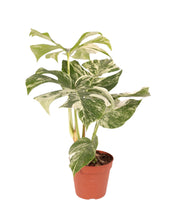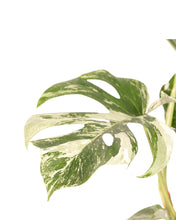Monstera deliciosa 'Variegated', often called variegated Swiss cheese plant or variegated split-leaf philodendron, is a highly prized and distinctive vining plant, celebrated for its large leaves with prominent cuts and striking white or creamy patterns. This cultivated form of Monstera deliciosa displays glossy green foliage irregularly marked with pure white or cream, creating a dramatic and unique appearance. As it matures, its leaves develop characteristic openings and divisions. It is a stunning addition to indoor plant collections in the UK. It is a member of the Araceae family.
The genus name Monstera comes from a Latin word suggesting "monstrous" or "abnormal," referring to the unusual perforated leaves found in many species. Deliciosa means "delicious," alluding to its edible fruit, though this is rare indoors. 'Variegated' describes the presence of differently coloured zones in the foliage.
Light: Monstera deliciosa 'Variegated' thrives in bright light that is not direct. Strong, direct sunlight can scorch its leaves and lessen the variegation, while insufficient light may result in slower growth, less pronounced cuts, and a reduction of white colour in new leaves. A position near a window with filtered light in a typical UK home is ideal. Variegated forms generally require brighter light than their all-green counterparts.
Water: The potting mix should be kept consistently damp but not saturated. Allow the upper inch or two of the soil to dry between waterings. Ensure the pot drains exceptionally well to prevent root problems, which can be an issue, especially in the UK's climate. Reduce watering in autumn and winter when the plant's growth naturally slows.
Soil: An airy potting mix that drains well is essential. A mix specifically created for aroids, incorporating materials such as coco coir, perlite, and orchid bark, is often recommended to provide the necessary air circulation and drainage.
Fertilising: Use a diluted liquid fertiliser every two to four weeks during the active growing period in spring and summer. Reduce or stop fertilising during the autumn and winter months.
Temperature: This plant prefers warm temperatures, ideally between 18°C and 27°C (65°F and 80°F). It should be shielded from cold air currents and sudden temperature changes, which can occur indoors, particularly during colder UK months.
Humidity: Higher humidity levels are highly beneficial for Monstera deliciosa 'Variegated'. Consider using a humidifier or placing the plant on a pebble tray with water to maintain optimal conditions, especially during drier indoor periods in the UK. This can also encourage the development of aerial roots.
Growth Habit: This Philodendron exhibits a strong vining or climbing growth habit. Providing a sturdy support such as a moss pole or trellis is crucial for encouraging larger leaves with more pronounced cuts and vigorous vertical development. It will produce aerial roots that attach to these surfaces.
Toxicity: Like all Monsteras, this plant is toxic if eaten by humans or pets.
The pictures show examples of stock. You will receive a plant similar to the one pictured.



